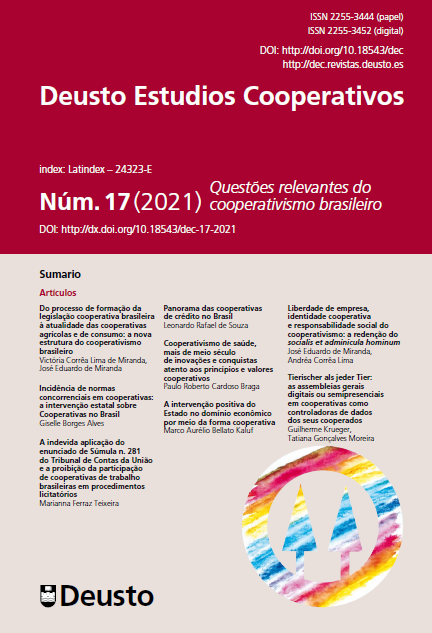Freedom of business, cooperative identity and social responsibility of cooperativism: the redemption of socialis et adminicula hominum
Abstract
According to the Brazilian Constitution, the economic order advocates freedom of enterprise, provided that it is exercised in compliance with the principles that enhance the condition of man and the quality of the environment. In this sense, social responsibility determines that all business strategies are thought and developed, optimizing the involvement of organizations with issues that prove to be priority to the realization of people, directly or indirectly integrated into the business, and to the improvement of the surrounding conditions. Within this perspective, the cooperative identity promulgated by the International Cooperative Alliance emphasizes the integration of the concept of cooperative with the values and principles that establish that man is the beginning and the end of Cooperativism. Acting in line with the social good, and the good of the individual, since the vertex representing social responsibility is, in essence, the cause and effect of Cooperativism itself. This purpose was confirmed possible outside the Cooperatives environment, through the development of a practical experiment, conducted by a Research Group located at the UNICNEC University Center, in the city of Osório, in the State of Rio Grande do Sul.
Received: 02 February 2021
Accepted: 18 March 2021
Downloads
The authors, by submitting their manuscripts to the Deusto Estudios Cooperativos (DEC), accept the conditions listed below on copyright and undertake to comply with them. They do not sign any document of assignment of rights to the Publisher.
1. Authorship: The author must be the sole creator of the work or legally acting on behalf of and with the full agreement of all the authors.
2. Copyright and Code of conduct:
a) Authors warrant that their work is original; has not been previously copyrighted or published in any form; is not under consideration for publication elsewhere; its submission and publication do not violate the Ethical Guidelines of DEC and any codes (of conduct), laws or any rights of any third party; and no publication payment by the Publisher (University of Deusto) is required.
b) Authors grant to the Publisher the worldwide, sub-licensable, and royalty-free right to exploit the work in all forms and media of expression, now known or developed in the future, for educational and scholarly purposes.
c) Authors retain the right to present, display, distribute, develop, and republish their work to progress their scientific career provided the original publication source (DEC) is properly acknowledged.
d) Authors warrant that no permissions or licences of any kind have been granted or will be granted that might infringe the rights granted to the Publisher.


3.jpg)
3.jpg)







